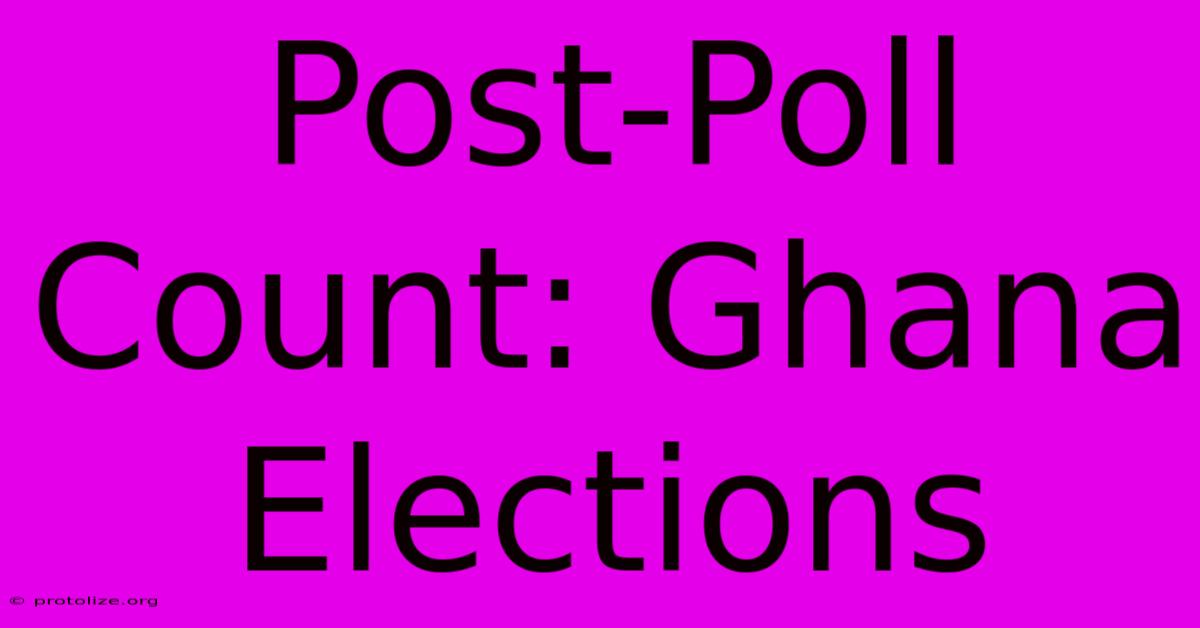Post-Poll Count: Ghana Elections

Discover more detailed and exciting information on our website. Click the link below to start your adventure: Visit Best Website mr.cleine.com. Don't miss out!
Table of Contents
Post-Poll Count: Ghana Elections – A Deep Dive into the Process and its Implications
Ghana's elections are renowned for their generally peaceful and democratic nature. However, the post-poll count process remains a critical stage, influencing the final outcome and shaping the nation's political landscape. This article delves into the intricacies of Ghana's post-poll count, examining its procedures, challenges, and broader implications for Ghanaian democracy.
Understanding the Post-Poll Count Mechanism in Ghana
The post-election count in Ghana is a multi-stage process involving various actors, from polling station agents to the Electoral Commission (EC). Here's a breakdown of the key steps:
1. Polling Station Level Count:
This is the initial stage, where agents from participating political parties meticulously scrutinize the votes cast at each polling station. Any discrepancies or challenges are noted and documented at this crucial juncture. This stage is vital for ensuring transparency and accuracy in the initial aggregation of results.
2. Constituency Collation:
Following the polling station count, the results are collated at the constituency level. This involves consolidating the tallies from all polling stations within a given constituency. The constituency collation officers play a significant role in ensuring the accurate aggregation of these figures. This step is subject to scrutiny by party agents, providing a further layer of verification.
3. National Collation and Declaration:
The final stage involves the national collation of results by the Electoral Commission (EC). This is a highly anticipated event, broadcast live to the nation and observed by international observers. The EC chair then officially declares the winner of the presidential election, and the results for parliamentary seats are also announced.
Challenges and Concerns surrounding Ghana's Post-Poll Count
Despite its established processes, the post-poll count in Ghana has faced several challenges over the years:
1. Delays and Disputes:
Delays in the collation and announcement of results can generate tension and speculation, potentially leading to disputes and challenges to the electoral process. Addressing these delays efficiently and transparently is crucial for maintaining public confidence.
2. Transparency and Access to Information:
Concerns have been raised about the level of transparency throughout the counting process. Ensuring easy access to information for political parties and the public is critical in promoting trust and accountability.
3. Security and Integrity:
Protecting the integrity of the ballots and ensuring the security of the counting process are of paramount importance. Any perceived or actual security breaches can undermine the credibility of the election results.
The Impact of the Post-Poll Count on Ghanaian Democracy
The post-poll count process directly impacts the stability and legitimacy of Ghana's democratic system. A transparent and efficient process strengthens public confidence in the election outcome, bolstering the democratic process. Conversely, a flawed or disputed count can lead to instability and challenges to the authority of the elected government.
Strengthening the System: Recommendations
Several measures can improve the post-election counting process in Ghana:
- Enhanced Technology: Utilizing technology for faster and more accurate collation of results can minimize delays and enhance transparency.
- Improved Training: Rigorous training for electoral officials and party agents can help ensure consistency and reduce errors during the counting process.
- Increased Transparency: Making the process more transparent through live streaming and readily accessible data can build public trust.
- Strengthening Dispute Resolution Mechanisms: Establishing clear and effective mechanisms for resolving disputes that may arise during the counting process is crucial.
In Conclusion:
Ghana's post-poll count is a complex and crucial phase of its election cycle. Addressing the challenges associated with this process through improved technology, training, and transparency is essential for strengthening Ghana’s democracy and maintaining its reputation for peaceful and credible elections. The post-poll count is not just a technical process; it's a cornerstone of Ghana's democratic foundation. Continuous improvement in this area is paramount for ensuring the long-term stability and integrity of the nation's political system.

Thank you for visiting our website wich cover about Post-Poll Count: Ghana Elections. We hope the information provided has been useful to you. Feel free to contact us if you have any questions or need further assistance. See you next time and dont miss to bookmark.
Featured Posts
-
Crm Leader
Dec 09, 2024
-
Tesco Chicken Recall Return Process
Dec 09, 2024
-
Nfl Bears Record Amid Losses
Dec 09, 2024
-
Crm And Artificial Intelligence
Dec 09, 2024
-
Close Call Garry Falls To Rakhmonov Ufc 310
Dec 09, 2024
